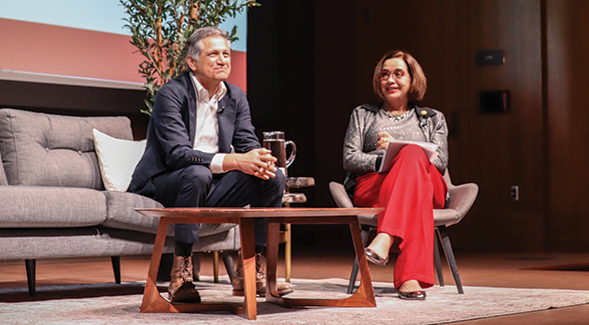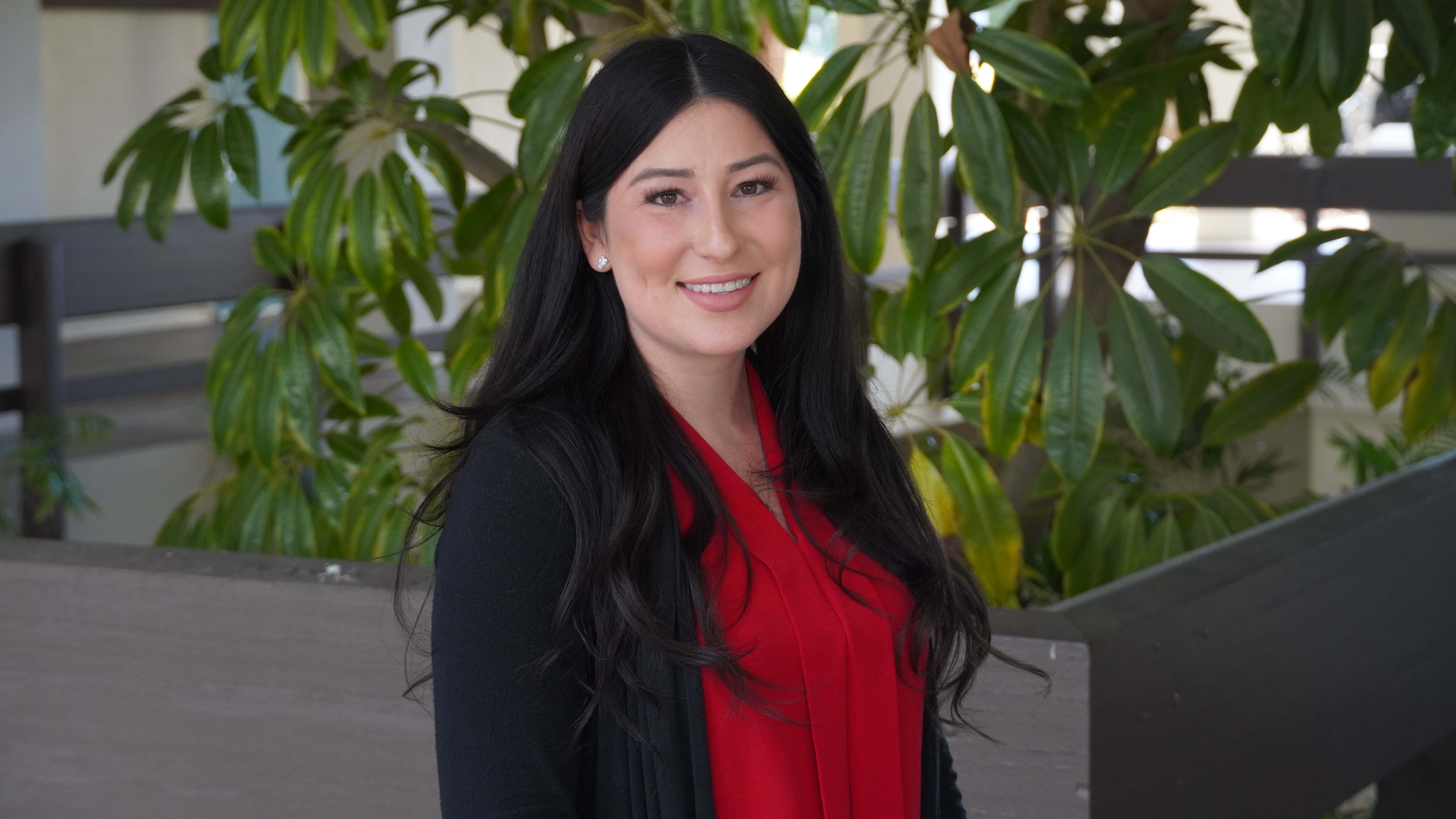Medical Tech Innovator Returns to SDSU for President's Lecture Series
Joe Kiani revolutionized equipment to monitor patient blood oxygen with insights gained in an electrical engineering classroom. Now he aims to do the same with a device to report opioid overdoses.

When Joe Kiani first enrolled at San Diego State University he was typically the youngest (15) and shortest (4 feet 11 inches) kid in the room. That was rarely a hindrance for the student who immigrated from Iran, now CEO of a medical technology company and a presidential adviser, but the same can’t be said for his original plan for his education.
“I wanted to be a doctor but I realized quickly I wasn’t good at chemistry,” Kiani said in remarks Thursday morning at the President’s Lecture Series at Conrad Prebys Aztec Student Union. “Fortunately I was good at physics, it came naturally to me.”
Kiani pivoted to electrical engineering and, after earning a B.S. (‘84) and M.S. (‘88), founded Masimo Corp. when the company he had been working for told him they weren’t interested in his ideas to improve their products.
Now based in Orange County, Masimo has grown into a global medical technology company known for breakthroughs in patient monitoring devices, particularly the use of adaptive signal processing in pulse oximetry to measure blood oxygen levels.
Kiani chatted with SDSU President Adela de la Torre and answered questions from students and faculty in the one-hour lecture, which drew an audience of around 150 to the second-floor Theatre.
“Do good things, why not try to push things in a positive way,” Kiani said, addressing prospective student entrepreneurs from his personal experiences. “You may have your own unintended consequences that are bigger than even what you’re trying to do.”
From Iran to San Diego
Kiani, whose father was pursuing an engineering degree, immigrated to the U.S. from Iran with his family in 1974 at age 9. The family of five settled originally in Albertville, Alabama, a city of barely 10,000 population at the time.
The Iranian Revolution of 1979 upended plans to return home; the family ultimately wound up in El Cajon and then La Mesa. At about the same time, Kiani entered SDSU, where having skipped three grades in his earlier education he was able to enroll at age 15.
Medical issues with his older sister — which led to a continual series of hospital visits and time in waiting rooms — and his mother’s career as a nurse were powerful influences on Kiani as a child and that original plan to go into medicine, he told de la Torre.
At SDSU, engineering professor Fred Harris became a highly influential mentor who “helped relate very complex mathematics to things you could do to help people,” Kiani said. “That really inspired me to want to finish, want to get started, want to do something constructive with it.”
Harris, who taught at SDSU for 50 years and is now a professor emeritus, joined Kiani on stage at the end of the lecture for an embrace and some additional questions.
Masimo survived the challenges of obtaining venture capital funding — as a kick-start, Kiani said he drew equity out of his condominium — and anti-competitive tactics from a more established company in the same field. Today, its pulse oximetry equipment is used on more than 200 million patients annually around the world, according to a company biography.
New technologies
One new device, inspired by a conversation Kiani said he had with former President Bill Clinton, aims to reduce opioid overdose deaths by users at home. It’s a pulse oximeter worn as a wristwatch (which Kiani had on and displayed to his SDSU audience) and capable of sending a message by phone to emergency responders when it detects respiratory failure.
The device has just been approved for production by the U.S. Food & Drug Administration, Kiani said. “We can hopefully save tens of thousands of lives.”
In 2012, he founded the Patient Safety Movement Foundation, dedicated to reducing patient harm through evidence-based practices in health care by eliminating human error. The organization’s goal is zero preventable patient deaths by 2030, and “I hope we get close to it,” he told de la Torre. “We’ve made a lot of progress,” and over 5,000 hospitals have committed to implementing practices toward the goal.
In September 2021, President Biden appointed Kiani to his Council of Advisors on Science and Technology (PCAST), which two weeks ago in San Francisco presented the results of a two-year report on patient safety.
“Finding and implementing solutions to reduce medical errors and other problems for patients’ experiences when hospitalized is going to improve health outcomes and protect our loved ones as well,” Biden said in his public remarks before meeting with the council. “And Joe Kiani knows a lot about that — been working with it a long, long time.”
In an interview prior to the lecture series, Kiani said the report’s major recommendations to Biden include:
- Make the Secretary of Health and Human Services responsible for patient safety, and ask the department to identify the biggest causes of preventable patient deaths.
- As effective patient-based practices are identified, use financial incentives to make sure hospitals implement them.
- For transparency, require hospitals to issue quarterly reports on the number of patients who have been harmed
Kiani was awarded an honorary doctorate from SDSU in 2021 and serves on the College of Engineering advisory board. His name reportedly appears on more than 500 patents and patent applications.


